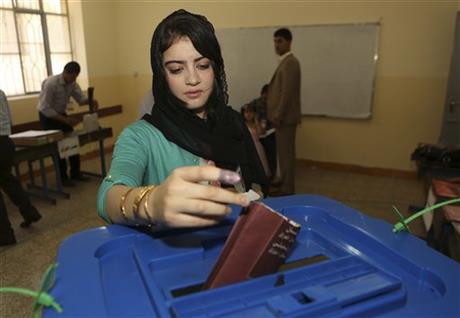
By QASSIM ABDUL-ZAHRA
FILE – In this Sept. 21, 2013 file photo, An Iraqi Kurdish woman casts her ballot in a regional election in Irbil, Iraq. The leading party in Iraq’s northern self-ruled Kurdish region has won the largest bloc in the local legislature, gaining eight seats. Kurds have enjoyed autonomy since 1991, when a U.S.-British no-fly zone helped protect them from Saddam Hussein’s forces until his fall in the 2003 U.S.-led invasion. Since then, the region has been largely peaceful compared to the rest of Iraq. (AP Photo/ Khalid Mohammed, File)
BAGHDAD (AP) — The leading party in Iraq’s northern self-ruled Kurdish region advanced its position in the local legislature on Wednesday, winning the largest bloc of seats even as its coalition partner fell behind a persistent opposition movement that took second place.
The results bring attention to public frustration over alleged corruption and nepotism by politicians and perceived heavy-handedness by state-contracted private security forces in the three-province region — themes upon which the opposition parties campaigned.
The Kurdistan Democratic Party, led by Kurdish regional President Massoud Barzani, secured 38 seats in September’s vote for the 111-seat regional parliament, Independent High Electoral Commission spokesman Safaa al-Moussawi told a press conference in the regional capital, Irbil. The KDP previously held 30 seats.
The main opposition party Gorran, or Change, won 24 seats. Iraqi President Jalal Talabani’s Patriotic Union of Kurdistan, which ran in coalition in with the KDP in the last election but on its own this time around, won only 18 seats.
The results are not expected to upend the domination of PUK and KDP, the region’s two main political parties which have a power-sharing agreement. But they do represent an advance for opposition movements, which could now have a say in the next regional government.
Gorran is led by Nosherwan Mustafa, a former senior PUK member who’s an outspoken critic of the leading parties, accusing them of corruption, nepotism and media intimidation. The absence of leadership in Talabani’s PUK and the ambiguity over his health condition after he suffered a stroke in December could have also been behind its poor showing, especially in its stronghold in Sulaimaniyah province.
Long-running disputes with the Arab-led government in Baghdad over territory, natural resources and power sharing are not expected to be solved soon however no matter what new government is formed, as all Kurdish parties remain united with regard to central authorities.
Kurds have enjoyed autonomy since 1991, when a U.S.-British no-fly zone helped protect them from Saddam Hussein’s forces until his fall in the 2003 U.S.-led invasion. Since then, the region has been relatively peaceful compared to the rest of Iraq.
On Sunday however that calm was shattered when twin suicide car bombs exploded at a downtown complex housing the Interior Ministry and other security agencies, killing at least six Kurdish troops and wounding 30 others.
Elsewhere in Iraq on Wednesday, gunmen downed at dawn a military helicopter north of Baghdad, killing its five-member crew, security officials said on condition of anonymity as they were not authorized to speak to the media. Four militants were killed in the combat outside the city of Tikrit, 130 kilometers (80 miles) north of the Iraqi capital.
Also, in the ethnically-mixed city of Kirkuk, a car bomb went off in a commercial area, killing one civilian and wounding 13 others, provincial police chief Maj. Gen. Jamal Tahir said. Kirkuk is located 180 miles (290 kilometers) north of Baghdad.
Iraq is undergoing its worst surge in violence since 2008, with near-daily militant attacks and relentless bombings blamed on hard-line Sunni insurgents. More than 5,000 people have been killed since April.
_____
Associated Press writer Sinan Salaheddin contributed to this report.



